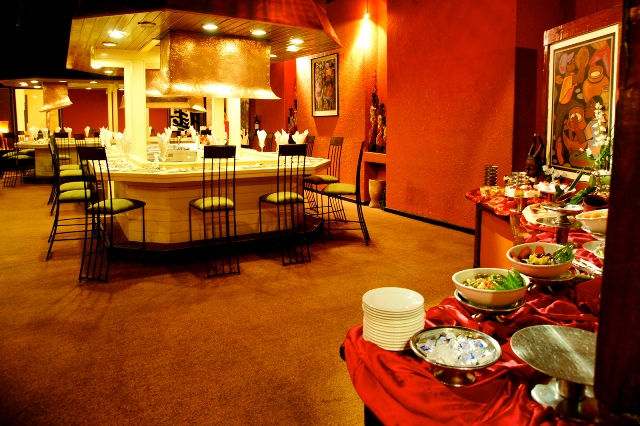


A FORTNIGHT ago, Kombahari restaurant, that flagship dining facility at the five star Rainbow Towers Hotel, resembled an African king’s palace. Patrons relaxed on impressive marble furniture while they enjoyed classic mixtures of modern and traditional cuisines, and, rare for this city, relaxation in a secluded glass coated enclave. The word komba means to surround in Shona, while hari means clay pot.
Clay pots, the hardened mud bowls that grannies use in the villages to showcase their traditional hospitality through the preparation of extraordinary stews, are associated with delicious African dishes. Vegetables mixed with peanut butter, or muriwo une dovi, mazondo, tripe (maguru) and pig or cattle heads are among the special meals prepared in the hari, which can cook at cracking temperatures. The hari can continue to boil sumptuous meals in its belly several minutes after fires are doused.
Families “surround” the hari to enjoy special meals after a hard day’s work in the village, often over traditional folktales. This tradition of surrounding the hari is what is being replicated at Kombahari. After my special lunch in the relaxed outfit where you are as welcome for lunch as you are for a quick pint in a pub, I emerged unsurprised why modern copycats christened this reservoir of high quality food and lifestyle Kombahari.
I had sneaked out of the newsroom with the usual suspect, Paul Nyakazeya, a colleague on the Financial Gazette’s business desk, for what we thought would be an ordinary outing. It turned out to be more magnificent than we had imagined. Fridays are traditional food days at the towers. The who is who in the political and business circles troop in to wine and dine. My usually subdued appetite was reignited.
A hybrid aura of the traditionally bred chicken and maguru confronted us. The cheerful waiter, Wilson, who was as impressive in his imitation of the Nigerian English accent as he was in outlining the vast range of meals by heart, described the chickens as “road runners”. More exquisite meals steadily remitted steam from the dishes, which were firmly escorted by cakes, ice cream, hot pudding and clusters of food-filled hari.
Holed in a secluded corner of the breathtaking towers, Kombahari, which has been given an impressive facelift in a US$7 million project involving the full facility, is now an embodiment of all things top notch. Its once neglected floors now resemble fine golden sands, the kind you want to dig your toes into. I have never seen Kombahari so fresh and elegant.
I plunged straight into a dosage of mushroom soup, and then turned the heat to the main course, a buffet of rice, sadza, the delicious road-runner, potatoes, grilled fish and beef, mazondo and foods too complicated only a hotelier would do justice to explain. For me, lunch without sadza is no lunch. It was no ordinary sadza, but a complete staple combining a fair texture and attractive colour.
I scooped spoonfuls, leaving space for beef just ahead, and then more loads of the African roadrunner drumsticks and collar bones. With my plate full, I came face to face with my favourite dish: grilled birds, which I later thought to be slippery wild quails or pigeons, whose appearance sent the loudest ‘eat me’ noise. They had been slaughtered specially to give the Friday lunch an ambiance of a complete African experience.
Then I remembered that Wilson had explained the full names, which I quickly forgot. But whatever they were, they were delicious. The African quail, or chihuta in Shona, is the breed that troubles battle-hardened herd boys in the villages this season of the year. They have a lot of fat, but never lose their enormously high energy, which allows them to fly fast and outdo the resilient herd boys who hunt them down in endless wars.
A few hours after quail wars in the pastures, captured birds are roasted and toasted on an evening bonfire for dinner. When fully roasted, the quail becomes dynamite in the cheek. Here, at the world renowned Rainbow Towers, grilled quails confronted me, well done by some of Africa’s best chefs. Yet my plate was full. I looked at Paul, turned my eyes to the waiter, spread my eyes over the birds again and trudged back to my table.
newsdesk@fingaz.co.zw